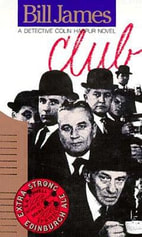
Ralph Ember runs the Monty, a pub with a dodgy reputation whose owner and clientele have both seen better days. Ralph is another of James’s upwardly mobile-looking petty criminals, a man who takes pride in his family and his once solid social reputation. His daughters attend an expensive school where Ralph campaigns (a little too personally) to keep Latin in the curriculum; in the pub, it’s no cheap beer for him when a sip of Armagnac will show the right touch of class. When Caring Oliver and Pete Chitty begin to put together a team for a bank job in Exeter, they reach out to Ralph because he’s a pro from the old days. But left unspoken is his reputation cemented from a job gone wrong years ago, where he was known thereafter as Panicking Ralphy.
Club is one of the series’ most visceral stories to date, not because it is overly violent or agonizing but because the author uses his third person prose to get inside and lay bare the psychosis of Ralph Ember, whose vulnerability and anxiety can produce outright claustrophobia in the reader. In James’s hands, the character is a completely believable straw man, working very hard to convince himself that he is still in complete control under pressure while his sweating limbs and shaking hands and lurking doubts scream otherwise. We spend the most time with Ralph in this book, very much inside his head, and it is company with an unlikable but completely believable flawed man, a graying dog who still tries to bark to show his status but doesn’t know if he’s fooling the rest of the pack or even himself.
Getting inside the mind of Sarah Iles, Club’s other truly troubled character, is even more unsettling. The Assistant Chief Constable’s wife is grieving the death of her lover Ian Aston, whose body is found on a trash heap near a pay phone. Aston may have been ambushed on his way to make a prearranged call to Sarah… and it’s possible that he may have been killed by her husband, pushed past the breaking point. With grief, uncertainty, and tension swirling within her – and the knowledge that the police would close ranks to protect their own – Sarah begins to break down and entertain very dark thoughts, with her hatred of life extending to her newborn baby girl.
What continues to amaze me about this crime series is how deftly and successfully Bill James explores his fictional world and the characters caught under the dome. As with Panicking Ralph Ember, the reader is given entrée into some of the cast’s perspectives, with the limited character views fully explored by the text. So we look at the situation through Ralphy’s eyes in his chapters, and know his every irritation and fear – and indeed his personality and belief system – through the third-person commentary. The same is true when a chapter focuses on Sarah Iles or Colin Harpur: we are in their world, feeling their emotions. (By contrast, the author never lets us share ACC Desmond Iles’s inner thoughts, and that’s a wise rule; neither reader nor colleague nor spouse knows what this potentially dangerous lawman is really thinking.) Crafting an interior point-of-view through prose is hardly a new literary tactic, but Bill James does it beautifully, and his characters are truly memorable and affecting because of this.
It’s also a marvel that so much wit and humor is infused into stories that often charge toward unhappy, painful conclusions and truths. I am amused by a turn of phrase or a wry description on every page and manage to laugh aloud from a detail or line of dialogue on every other. Consider this simple and sincere analysis through Ralph’s eyes as he makes an obligatory visit to case a bank:
Ralph Ember walked through the customer area of the bank at Exeter, trying to appear loaded and troublefree, and helped himself to a meaty handful of leaflets about special deposit account interest rates. His hands shook a little and he dropped a couple. They dived and carried like paper darts and he left them on the floor. He wanted no long scene here. If banks had any sense at all they would do sneak pictures of everybody who came in to collect investment brochures: no better way to get a nice view of the interior, and bank robbers’ cars and houses were waist-deep in the things.
Yare-Gosse declared: “With respect, may I remind you, Mr. Harpur, gentlemen, that our programme is called Where Is Truth? Our obligations are inescapable.”
“We have a maxim here: truth is what the jury says,” Harpur replied.
In the corridor afterwards, Iles snarled quietly, “Since when have you been up to epigrams, Harpur? You got that stuff about truth and the jury from me.”
“Well, it’s true, isn’t it?”
“True about truth? Are we moving into philosophy?”
“It’s a philosophical show he’s trying to put on, yes?”
“Oh, yes, he’s fucking dangerous all right. He believes he’s the people. All media do. Yet most of them are hardly even persons.”

Perhaps James rings the bell – or hits the reader over the head – a little too often with his chosen word, which appears more than two dozen times before this tale concludes. But it is a minor criticism; characterization, psychology, plotting, and wit are handled so winningly that a writer can be forgiven a bit of heavy symbolism. James must have enjoyed exploring the faults and fissures of his unsteady main character here: Panicking Ralph gets to headline his own story a decade down the road, when a 2001 series entry will bear his name.
 RSS Feed
RSS Feed